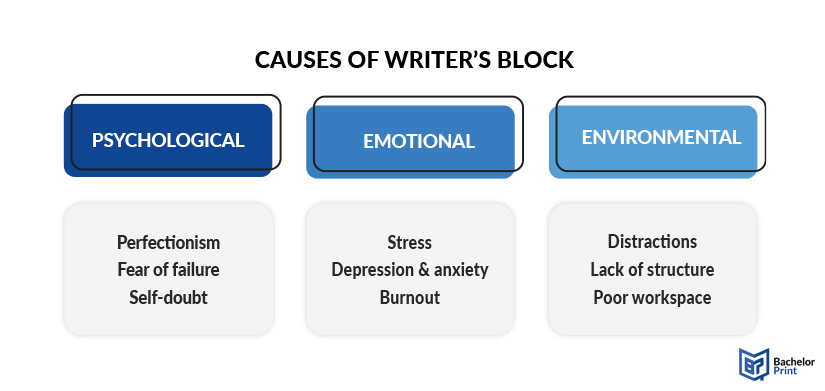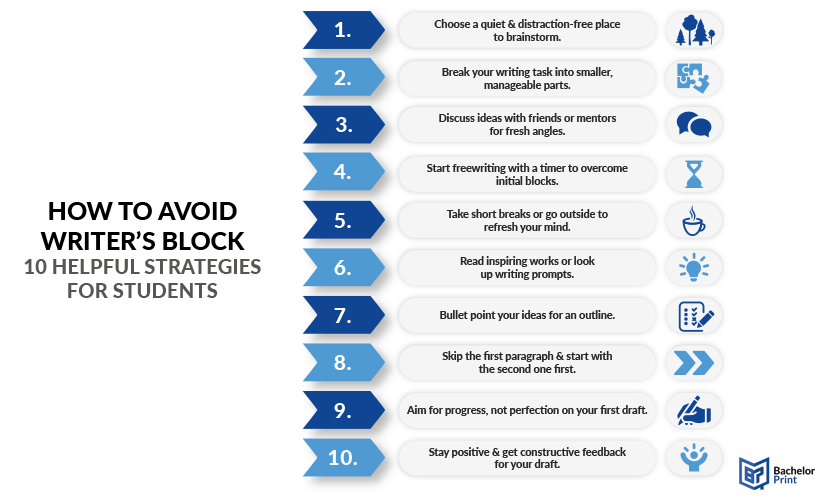
Writer’s block is a challenge faced by many, whether you’re a seasoned novelist or a student working on an academic essay. This frustrating barrier can hinder creativity and productivity, making it difficult to put thoughts into words. In this article, we will explore practical tips to overcome it, with a particular focus on academic writing. Whether you’re struggling to start a research paper or finding it challenging to continue your thesis, these steps will help you regain your writing flow.
Definition: Writer’s block
Writer’s block is a psychological condition that affects a writer’s ability to produce new work or continue existing work. It is characterized by a significant reduction in the ability to generate ideas, compose coherent thoughts, and express oneself through writing. This condition can vary in intensity and duration, ranging from a brief interruption in create flow to a prolonged full stop of inactivity. The causes of writer’s block are varied and can include psychological, emotional, and environmental factors. Overcoming writer’s block often requires a combination of strategies to address the underlying issues and reinvigorate the writer’s creative process. Writer’s block has impacted many writers, whether they are writing novels, songs, poems, or composing music.
Causes of writer’s block
Writer’s block can stem from various factors, which can be psychological, emotional, or environmental. Here are some common causes of writer’s block.
Below are three psychological factors that can cause a creative block.
Perfectionism
For many writers, perfectionism is a common issue that can cause creative stagnation since the writer is overly concerned with producing flawless work. This obsession with perfection can lead to excessive self-editing, procrastination, and a reluctance to move forward with writing projects.
Perfectionists often set unrealistic standards for themselves, which can stifle creativity and hinder progress. The fear of not meeting their own highly set expectations can paralyse a writer and prevent them from even starting a new piece or completing an ongoing project. Many students have amazingly creative ideas, yet keep staring at a blank paper when trying to put them into words.
Fear of failure
The fear of failure is another significant contributor that torments writers’ minds. Some may worry that their work will be judged harshly or that it will not meet the expectations of their audience. This anxiety can create immense pressure, making it difficult to put pen to paper.
The fear of producing subpar work can lead to avoidance behaviors, where writers delay or abandon their projects altogether. This fear is psychologically rooted in the desire for external validation and the dread of negative feedback, which can interfere with the writing session.
Self-doubt
Surely, we all have doubted our abilities at some point. In a writing context, self-doubt involves a lack of confidence in one’s writing abilities. Writers may constantly question the quality and value of their work, which leads to a cycle of negativity that hinders productivity.
This lack of confidence in their writing skills can be fuelled by previous rejections, comparisons to other writers, or internalized criticism. Self-doubt can make it challenging for writers to completely believe in their ideas and persist through the writing process, resulting in stalled progress and a mountain of unfinished projects.
There are several emotional factors that result in writer’s block. Some are mentioned below.
Stress
Stress, whether related to a writing project or other aspects of life, can significantly impact a writer’s ability to focus and create. High levels of stress can lead to mental exhaustion, making it difficult to generate new ideas or continue with existing projects. The pressure to meet deadlines, coupled with personal responsibilities, can overwhelm writers, which can cause them to feel paralysed and unable to write.
Depression and anxiety
Mental health issues such as depression and anxiety can sap energy and creativity. Depression often brings feelings of hopelessness and a lack of motivation, while anxiety can cause overthinking and fear of judgment. Both emotional conditions can be paired with psychological factors, which can further reduce the ability to produce coherent and engaging content and cause writing anxiety, even for writing experts.
Burnout
Continuous writing without adequate breaks can lead to burnout, which is characterized by both physical and emotional exhaustion. Burnout can diminish a writer’s passion for their work, resulting in a lack of inspiration and decreased productivity. It typically stems from overworking and now allowing plenty of time for rest and recuperation.
Three reasons for environmental factors causing writer’s block are explained below.
Distractions
A noisy or chaotic environment can disrupt concentration and flow, making it difficult for students to immerse themselves in their work. Distractions from family members, electronic devices, or background noise can break a writer’s train of thought and lead to frustration and decreased productivity.
Lack of structure
An unstructured writing routine can contribute to writer’s block. Without a clear plan or timetable, many writers may struggle to find the time and motivation to write. This lack of organisation can lead to procrastination and inconsistent writing practice, making it harder to develop and maintain momentum.
Poor workspace
An uncomfortable or cluttered workspace can negatively affect a writer’s productivity. A disorganized environment can create a sense of chaos, making it difficult to focus. Additionally, physical discomfort from an unsuitable chair, desk, or lightning can distract from the writing process, leading to reduced efficiency and creativity.
Below is an image that encompasses all causes mentioned above.

Strategies to overcome writer’s block
Many people use the term “writer’s block” as an excuse for the factors mentioned in the preceding paragraph, instead of identifying what is really stopping them from confident writing. This blanket term is essentially counterproductive since it doesn’t help figure out what the issue is. Below, we’ll go through helpful tips that can help you defeat your “final boss” and successfully write and finish your work before the deadline.
“I don’t even know where to start…”
Start a brainstorming session where you can freely jot down any ideas related to your topic without worrying about organisation . Perhaps you can even ask friends or family members for ideas, suggestions, or what they would be interested in regarding your topic.
It’s important to start planning by creating a basic outline or a mind map because then you can finally start writing something down. You can also use the free writing strategy, where you start a timer and write down anything without pausing to think or worrying about grammar.
This can overcome the initial barrier, and if you can’t think of a first paragraph, why don’t you just skip it for now and start with the second one? For additional information, we have an article on how to write an introduction or how you can easily come up with research questions.
“The topic I’ve been assigned is boring…”
Frame the task as a challenge to find the interesting parts of a seemingly boring topic. Discuss your topic with classmates or friends to gain new perspectives and understand the relevance of the topic and how it affects different communities.
Consult your supervisor and discuss the extent to which the assignment can be adjusted. If changing the main objective of the assignment is not an option, try to understand the underlying purpose of the task.
“I’m worried that my work isn’t good enough…”
Give yourself permission to write something bad. Your first draught is not your final draught, you can go over your entire draught multiple times as long as you don’t look at a blank page. Every so often, a word vomit draught phase is precisely what you need because no work is perfect. Aim for progress, not perfection.
It often helps to share your work with teachers or peers early in the process to get constructive feedback, then use that to make improvements. You should focus on the learning process and the knowledge you’re gaining, rather than just the final grade after you submit your project on time.
“I struggle to focus and get easily distracted…”
Find a quiet place to work where you can minimize interruptions. If you are unable to go to a quiet environment, get some noise-cancelling headphones. Eliminate distractions by turning off your phone, disabling notifications on your devices, or using browser extensions to block distracting websites. It often helps to break your work into manageable tasks.
You don’t have to write your whole academic paper right now. Set a writing timetable; write a little bit, go over it again, and maybe you’ll get more ideas during the editing process. You can also look up writing prompts online to jumpstart inspiration.
We have listed all strategies to avoid writer’s block in the image below.

FAQs
You can try the following strategies against writer’s block:
- Start brainstorming ideas
- Begin free writing with a timer
- Divide your project into smaller tasks
- Read and research to get inspiration
- Look up writing prompts online
- Eliminate distractions
- Use mind maps to organise your ideas
- Discuss your ideas with others
- Understand the relevance of your topic
Writer’s block can have many factors:
- Perfectionism
- Self-doubt
- Fear of failure
- Stress
- Burnout
- Depression or anxiety
- Distractions
- Lack of structure
- Poor workspace
When experiencing writer’s block, you can feel a sense of irritation at not being able to produce any writing, which can cause self-doubt and a lack of motivation towards writing. Many writers start procrastinating because of their lack of creative flow.
Many writers hold unrealistic standards and persist in perfectionism, which can make it difficult to break free from writer’s block. This can cause persistent negative thinking or constant pressure from themselves, which in turn can make it challenging to relax and write freely.
